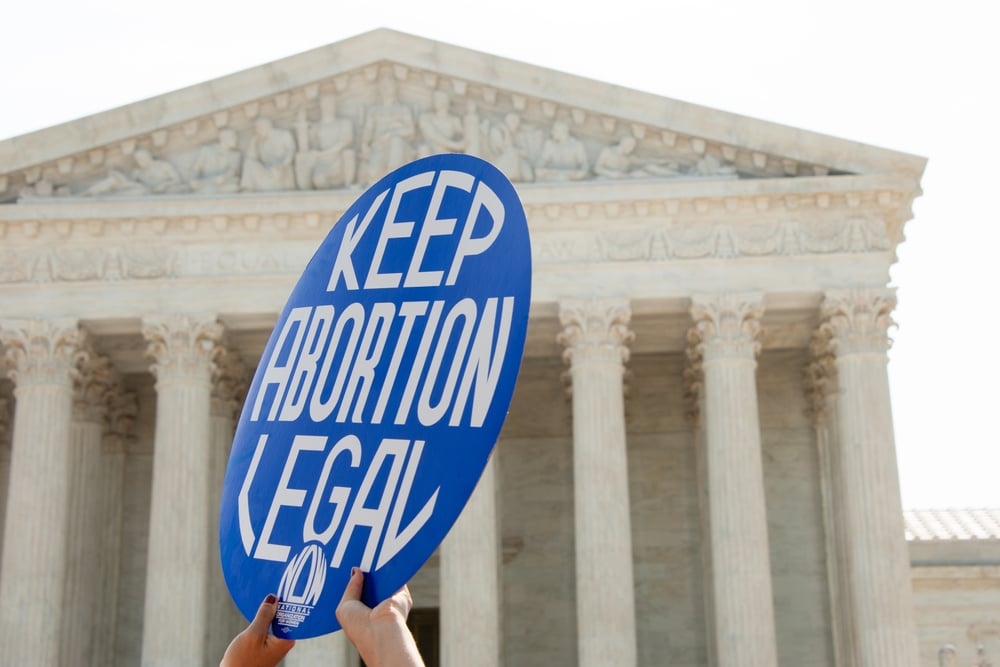Earlier this week, Emma Green at The Atlantic brought attention to a weird addition to the list of Official Partners of this Saturday’s Women’s March on Washington: a group called New Wave Feminists. The slogan on their website reads “Badass. Prolife. Feminists.” Their Facebook page declares they are “here to take feminism back from those who have corrupted it.” And for a brief moment, they were a partner in the march. After the publication of that Atlantic article, the organizers apologized for their “error,” saying “The Women’s March’s platform is pro-choice and that has been our stance from day one. The anti-choice organization in question is not a partner of the Women’s March on Washington.”
But then they did it again. And Then There Were None, a group dedicated to removing staff from clinics that provide abortion services, was added—
Why was And Then There Were None, an anti-choice organization dedicated to driving clinic staff out, added to @womensmarch partners? pic.twitter.com/cKHL1Cednv
— allie (@OhioFeminist) January 18, 2017
And then quietly removed when people began to take notice.
.@womensmarch @PPFA @OhioFeminist UPDATE: And Then There Were None was quietly removed as a partner on the site. pic.twitter.com/qDNFSlHhYD
— Lily Bolourian (@LilyBolourian) January 18, 2017
This raises more questions than it does answers, clearly. Were these “errors”? Are the organizers simply not paying close enough attention to the partnership applications? Or were they really willing to welcome these anti-choice groups as partners? And what even constitutes an official partnership? It’s different from a sponsorship—there are hundreds of partners listed on the event’s website, but only a handful of official sponsors, the most prominent being Planned Parenthood. So what are the qualifications for official partnership? Is that title given to any group that wants it and, presumably, aligns with the event’s official principles?
Because these groups do not share the event’s principles. The official guiding tenets, along with “equal pay for equal work” and ending racial profiling, they state “We believe in Reproductive Freedom.
This means open access to safe, legal, affordable abortion and birth control for all people, regardless of income, location or education. We understand that we can only have reproductive justice when reproductive health care is accessible to all people regardless of income, location or education.
So this begs another question—why would these groups even want to be included as partners in the event? No one is keeping them from marching. That seems to be the general complaint being lobbed at the organizers, but no one is barred from marching for the rights they personally value. But to submit an application for an official partnership with a group that is fundamentally opposed to your entire mission, well, I’m not sure why these groups, who despise reproductive rights enough to dox clinic workers, as ATTWN has done, want that association.
The Women’s March on Washington is “a women-led movement bringing together people of all genders, ages, races, cultures, political affiliations and backgrounds.” It describes itself as aiming to “affirm our shared humanity and pronounce our bold message of resistance and self-determination.” As such, intersectionality is essential. But is there any way possible to keep that intersectionality intact while also upholding a list of guiding principles? If a group of Klanswomen or an anti-immigration organization were denied official partnership, would we be questioning that?
If the Women’s March is expecting anti-choice protesters (which they are, as is their right, even if many of us find the idea horrifically disappointing), who would possibly expect them to also grant those same people partnership?
All of this—the inclusion, the quiet removal, the re-inclusion—comes under even more fire after the wording of those “Unity Principles” was changed in regard to the event’s official stance on sex work. Like with the anti-choice groups, the organizers’ stance on this community also keeps waffling. Those principles stated they “stand in solidarity with the sex workers’ rights movement,” before changing that support to focus solely on those “exploited for labor and sex,” and finally (unless it changes yet again), switching back to the original statement of solidarity.
I cannot imagine what an enormous undertaking these organizers have before them, attempting to put together an event that represents and speaks to literally all women. It is, almost certainly, wholly impossible.
But does that mean we’re not allowed to be critical? Does that mean we need to cut them slack as they appear to value those aggressively opposed to reproductive rights over autonomous sex workers? It’s certainly easier for those who already feel represented in this event to say so.
For those who feel excluded, I can only hope that this march, and those happening all around the country on Saturday, have swelled in scope to the point where it’s outgrown its official self, or at least that on that day, in the moment, while marching, it can feel like it. Hopefully, tomorrow, everyone who values their rights and their well-being and their place in this country, will feel part of their community.
(image via Shutterstock)
Want more stories like this? Become a subscriber and support the site!
—The Mary Sue has a strict comment policy that forbids, but is not limited to, personal insults toward anyone, hate speech, and trolling.—
Follow The Mary Sue on Twitter, Facebook, Tumblr, Pinterest, & Google+.










Published: Jan 20, 2017 11:12 am